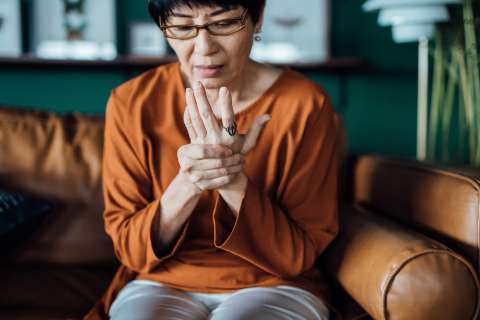If you’re one of the 90 percent of people in the United States who use an electronic device before bedtime, you might not be getting the quality sleep you need. Many people think scrolling through their social media feed is relaxing. In reality, it makes it harder to fall asleep.
Electronics and sleep: They don’t go together
Electronic devices like smartphones, laptops and TVs emit an artificial blue light that mimics sunshine. Sunlight signals the body to wake up. Here’s how the blue light streaming from your device stimulates you both physically and mentally, making it more challenging to fall asleep:
Tricks your internal clock
The optic nerve in the eye sends light and dark signals to a group of cells in the brain known as the suprachiasmatic nucleus (SCN). Those signals tell the body’s internal clock when it’s time to wake up or go to sleep. When your body clock isn’t set right because of interference from blue light, the SCN can’t activate normal bodily functions and regulate hormones.
Slows the body’s release of melatonin
The pineal gland is responsible for producing the hormone that regulates sleep called melatonin. The SCN triggers the pineal gland to produce melatonin as daylight starts to fade. The hormone is released into the bloodstream starting at around 9 p.m. and continues to rise through the early part of the night. As this happens, you get sleepier and remain so until daylight prompts the SCN to wake the body.
Activates your brain
Watching a movie or responding to emails may feel harmless, but they stimulate your mind and make it harder to relax and ready yourself for sleep. Your brain needs time to settle down and unwind to switch into sleep mode.
Blue light inhibits sleep quality
The more you use a device in the evening, then, the harder it is to fall or stay asleep. Your bedtime gets delayed, which delays how much restorative sleep you get. This causes you to feel tired and groggier in the morning, which will affect your productivity and confuse your internal body clock. It becomes a cycle that is difficult to break for both kids and adults.
To get the sleep you need, follow these rules:
- Set a digital curfew: As a family, turn off electronic devices. The National Sleep Foundation recommends turning them off an hour before bedtime.
- Keep bedrooms device-free: Avoid bringing electronic devices into the bedroom. If you use your bedroom only for sleep, entering it when it’s time for bed becomes a powerful sleep cue for your body.
- Read from a lamp: Turn off the overhead lights and use a lamp to see your book. A printed book is best, but the Kindle Paperwhite is an acceptable alternative because it doesn’t emit the blue light that phones and tablets do.
If you or your family members struggle with getting enough high-quality sleep, the UCLA Sleep Center can help. Learn more about the sleep disturbances and treatments available.



